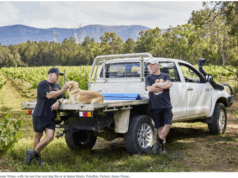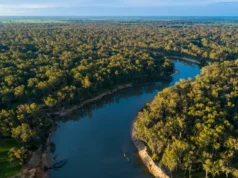
Photo credit: Ricky French
On April 3, 1961, a 22-year-old junior at the fossils department of Melbourne Museum was walking at night in the montane ash forest near the logging town of Camberville, 86 kilometres east of Melbourne, when his torch beam fell upon two piercing eyes staring back at him in the bushes. A member of the Field Naturalists Club, Eric Wilkinson knew what he was seeing, he just didn’t believe it. Because the animal he was looking at wasn’t thought to exist.
Wilkinson had found himself face-to-face with a Leadbeater’s possum, a marsupial first described in 1867 but not seen for more than 50 years and presumed extinct. The museum didn’t believe him at first but eventually sent an official expedition that went back into the forest, found another possum and – to Wilkinson’s dismay – shot it. Now they had a specimen. Over the next 15 years the elusive animal was recorded in just 50 sites. In 1971 it became one of Victoria’s faunal emblems, the only mammal endemic to that state, and in 2015 it was listed as critically endangered. Best estimates are that about 2000-4000 are confined to one region in Victoria’s Central Highlands.
That it was found near Cambarville, a logging town, was no accident. The possum and many other native animals share with the forestry industry an attraction to the majestic mountain ash trees that dominate the Central Highlands. The old hollow-bearing trees make great nesting sites. They also make great kitchen benches, although government figures show just 13 per cent of native forest logged in Victoria becomes timber products.
In May this year, the Leadbeater’s possum and another vulnerable marsupial, the greater glider, took centre stage in a Federal Court case launched by a small community group against Victoria’s state-owned logging agency, VicForests. In a landmark ruling, the court decided VicForests had been logging unlawfully in 26 areas of habitat critical to the two mammals, and planned to log unlawfully in 41 more. Four more groups have filed legal action against the agency and at least 92 logging zones covering about 3575ha are now under injunction. Already struggling to fulfil wood pulp contracts after years of logging, plus losing forest to bushfires and now court cases, VicForests’ preferred native timber supply is fast drying up, and with it Victoria’s native timber industry. It’s an industry already on its last legs since the Andrews Government announced it would be phased out from 2024, ending in 2030. But many doubt it will last that long.
Outside Victoria the forestry industry is on alert as the broader ramifications of the judgment sink in. Smelling blood in the water, the Bob Brown Foundation has lodged its own Federal Court case against Tasmanian state-owned logging agency Sustainable Timber Tasmania, challenging the validity of the legal framework forestry operates under. It hopes a win will achieve an immediate ban on native timber logging and open doors for similar action in other states.
But what no court or government can control, and what insiders say the industry is most worried about, is the waning social licence for native forest products, something the country’s most powerful retailers are all too aware of. In July, four weeks after the Federal Court judgment, hardware giant Bunnings announced it was dumping VicForests timber from its shelves. It wasn’t a gentle breakup. “Bunnings has a zero-tolerance approach to illegally logged timber,” was the company’s unambiguous statement. Officeworks is also cutting ties and from December will stock only products approved by the Forest Stewardship Council (FSC), the global certification system that gives a tick to native forest products judged to have come from responsibly managed sources.
These events have left the native timber industry shell-shocked. They argue that minor environmental breaches are negligible and inevitable, and that climate change and bushfires are a far greater threat to the Leadbeater’s possum than logging. The possums are doing fine, they say; it’s people’s livelihoods – in a state already struggling with economic collapse wrought by the latest Covid-19 lockdown – that are critically endangered.
The Leadbeater’s possum may be tiny – it weighs just 135g and would fit in the palm of your hand – but the campaign waged in its name has been colossal. The Victorian emblem could become emblematic for bringing an industry to its knees…
Read the full story here


